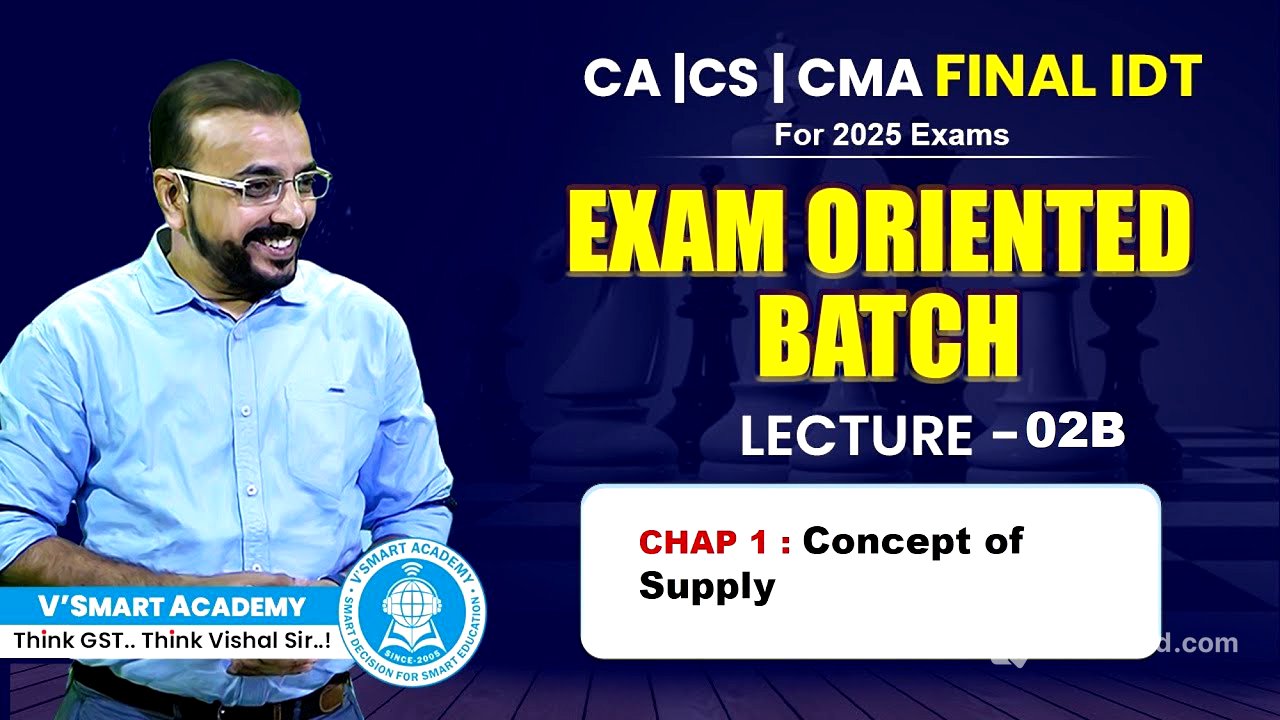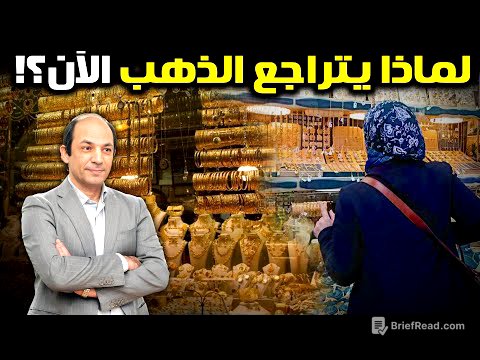TLDR;
This video provides a detailed explanation of the concept of supply under GST, focusing on Section 7 of the GST Act. It covers various aspects including forms of supply, the importance of consideration, and specific inclusions and exclusions like money, securities, subsidies, and deposits. The lecture emphasizes understanding the underlying concepts rather than rote memorization, and encourages viewers to apply the knowledge through practice questions.
- Forms of Supply
- Importance of Consideration
- Specific Inclusions and Exclusions
Introduction to Supply under GST [0:06]
The session begins by revisiting the concept of supply under Section 7 of the GST Act, emphasizing its inclusive definition. Activities that fall under the definition of goods and services are generally considered as supply, unless specifically excluded by the government through Schedule Three. Section 7(2) overrides Section 7(1), allowing the government to exclude certain activities from being considered as supply.
Forms of Supply and Key Considerations [1:57]
The discussion covers various forms of supply, including sale, transfer, exchange, license, rental, lease, and disposal. The main object of GST is to levy tax on transactions where consideration is involved. It's important to determine whether an activity falls under GST, considering factors like consideration and the course of business.
Definition of Goods and Services [4:04]
The lecture explains the definitions of goods and services under GST. Goods are defined as every kind of movable property other than money and securities, including actionable claims, growing crops, and things attached to land. Services are defined as anything other than goods, money, and securities, but include activities involving the use or conversion of money with separate consideration. Interest on loans, deposits, and advances is currently exempt from GST.
Meaning of Money and its Exclusions [8:59]
Money includes Indian legal tenders, foreign currency, cheques, promissory notes, bills of exchange, letters of credit, drafts, pay orders, traveler's cheques, money orders, and electronic remittances recognized by RBI. However, it excludes currency held for numismatic value. Transactions involving money are generally excluded from GST, but this exclusion is critical for defining the scope of banking and financial transactions.
Financial Services and Banking Transactions [11:54]
Financial services provided by banks and institutions, such as lending and borrowing, are generally excluded from GST because they involve transactions in money. However, any separate consideration charged, such as processing fees or commission, is subject to GST. Commercial papers and certificates of deposit are considered transactions in money and are therefore not subject to GST.
Securities and Derivatives [17:38]
Securities, as defined under the Securities Contracts Regulation Act 1956, are excluded from the definition of goods and services, meaning no GST is levied on their sale or purchase. However, separate consideration charged for services like brokerage or portfolio management fees is subject to GST. Derivative contracts are also considered security contracts and are not subject to GST, unless the settlement involves the actual delivery of the underlying commodity.
Circulars on Lending of Securities and Holding Company Shares [28:31]
A circular clarifies that the lending of securities is treated as a supply of service by the lender, and the fees charged are subject to GST. Another circular clarifies that the holding of shares by a holding company in a subsidiary company is a transaction in securities and not subject to GST.
Analysis of Key Terms: Sale, Transfer, Exchange, License, Rental, Lease, and Disposal [33:44]
The terms sale, transfer, exchange, license, rental, lease, and disposal are examples of forms of supply but are not defined in the GST Act. GST is levied on these forms if they occur in the course of business and involve consideration. Transfer includes hire purchase transactions, and exchange involves the transfer of goods or services for other goods or services, with GST applicable on the value of the supply.
Made and Agree to be Made [41:42]
"Made" refers to supplies where goods or services have been provided, and payment is received later, while "agree to be made" refers to agreements where advance payment is received. GST is generally applicable on advance payments, but a notification (66 BA 2017) provides relief for the supply of goods, suspending GST on advance payments and requiring it to be paid only on an invoice basis. This relief does not apply to services, where GST is applicable on advance payments.
Meaning of Consideration [48:48]
Consideration is a critical element for determining supply under GST. It includes any payment made or to be made, whether in money or otherwise, in connection with the supply of goods or services. It also includes the monetary value of any act or forbearance in respect of the supply. Subsidies from the central or state government and deposits are excluded from consideration, unless the deposit is utilized as consideration for the supply.
Examples and Clarifications on Consideration [1:11:31]
The lecture provides examples to illustrate the concept of consideration, including cases involving charitable institutions and artists. Donations to charitable trusts are not subject to GST if there is no obligation or expectation of a quid pro quo. However, if the donation is linked to a specific service or benefit, such as advertising, it is considered consideration and subject to GST. Similarly, the initial act of sending art to an art gallery for exhibition does not constitute a supply until the art is sold.
Amendments and Practice Questions [1:21:31]
The session concludes with a reminder about potential amendments in the GST Act and provides practice questions for the viewers to solve. It emphasizes the importance of understanding the concepts and applying them through practice to master the subject.









